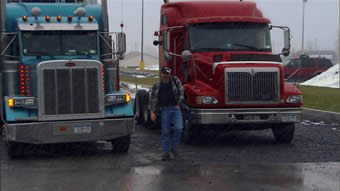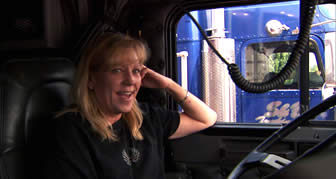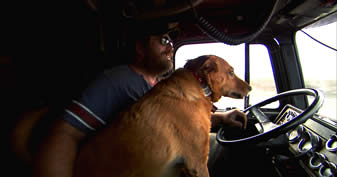BIG RIG is a broad portrait of modern America as seen through the eyes of long-haul truck drivers. Spanning 21,000 miles, 45 states, and dozens of truck stops, director Doug Pray and producer Brad Blondheim (the team who created SCRATCH) went far beyond just stereotypical chrome and coffee culture and made a film that delves deeply into the lives and personal struggles of these working-class heroes, who are, literally, carrying the nation upon their backs.
From New York City’s Hunt’s Point Market, where semis arrive at 3am to deliver produce to feed the entire Northeast, to California’s San Joaquin Valley, where that produce came from, BIG RIG is the ultimate road-trip movie. And though it’s filled with gorgeous vistas, it is really about the human will to survive. Along the way, you’ll get to know a Mississippi driver who’s battling Graves disease while his son fights in Iraq; a mother of three from Ohio who carries a concealed weapon for fear of truckstop violence; a native-American who uses his 18-wheeler to visit tribes throughout the country while delivering vinyl products; an Idaho man whose patriotism has him to wanting to overhaul our government, and a Polish immigrant who defines freedom for us, to name a few characters. Unlike any other film, BIG RIG demonstrates how this lonely profession has attracted a group of fiercely independent souls. As one young Michigan driver says, “Truckers represent the last of the spirit of the American cowboy… it’s a dying breed out there.”
BIG RIG director, cinematographer and editor Doug Pray is best known for his feature-length documentary films about American subcultures. His work includes SCRATCH, about hip-hop DJs, and HYPE!, the award-winning film about the explosion and mass-consumption of the Seattle music scene of the early 1990s. Both films premiered at Sundance to rave reviews and received worldwide theatrical distribution. His most recent film, INFAMY, is an intense journey into the lives and minds of six notorious graffiti writers (released Fall 2006). He has another feature premiering theatrically this Spring through Magnolia Pictures entitled SURFWISE, a portrait of the legendary Paskowitz surfing family. Doug is currently in production on an untitled documentary about the minds of the world’s most influential advertising creatives of the last 50 years. Doug’s other feature work includes the Josh Kornbluth performance film, RED DIAPER BABY, which he directed, and AMERICAN PIMP, which he edited for directors Allen and Albert Hughes. Originally from Madison, Wisconsin, he has a BA in sociology from Colorado College, and an MFA from UCLA’s School of Film and Television. He resides in Los Angeles.
SCRATCH, about hip-hop DJs, and HYPE!, the award-winning film about the explosion and mass-consumption of the Seattle music scene of the early 1990s. Both films premiered at Sundance to rave reviews and received worldwide theatrical distribution. His most recent film, INFAMY, is an intense journey into the lives and minds of six notorious graffiti writers (released Fall 2006). He has another feature premiering theatrically this Spring through Magnolia Pictures entitled SURFWISE, a portrait of the legendary Paskowitz surfing family. Doug is currently in production on an untitled documentary about the minds of the world’s most influential advertising creatives of the last 50 years. Doug’s other feature work includes the Josh Kornbluth performance film, RED DIAPER BABY, which he directed, and AMERICAN PIMP, which he edited for directors Allen and Albert Hughes. Originally from Madison, Wisconsin, he has a BA in sociology from Colorado College, and an MFA from UCLA’s School of Film and Television. He resides in Los Angeles.
Cinema Without Borders: What motivated you to make BIG RIG?
Doug Pray: A lot of my work in the past has been about American subcultures. I have done music films. I have done everything about the Seattle music scene and hip hop ad the birth of the DJ. I have done films about graffiti, and surfing. I continue to do these films about different subcultures, and trucking in America is very different. It is not music or anything but there is a myth and image associated with trucking. There is an image that America has about all the truckers out there because there are about three million of them in this country. It is a huge community that  used to represent something very powerful and romantic, like a cowboy. Like a cowboy out on film, because we idolized that original image of the trucker. While making the film we found that there was a message in the film. It wasn’t really a political film but it became a larger statement of how America treats its working class. It was about how these people are supporting the entire nation but there is a lot of disrespect for them.
used to represent something very powerful and romantic, like a cowboy. Like a cowboy out on film, because we idolized that original image of the trucker. While making the film we found that there was a message in the film. It wasn’t really a political film but it became a larger statement of how America treats its working class. It was about how these people are supporting the entire nation but there is a lot of disrespect for them.
CWB: How did you manage to find a closer relationship with the people in the film?
DP: The way we did the film was like hitchhiking. We would go to truck stops and look for interviews. There were many times they would say no, but the times they said yes I would get an interview and would go for hours. I would sometimes even go to their house and really do a whole story on them. It is a collection of stories from all across the country. I did get to know all of my subjects pretty well. Some of them just drive off into the sunset and are never seen again. Other ones are in the movie and are invited to come to the premiere of the movie, and we talk to them. With the truckers in my film, the film means something very different to them then it does to me. To me it is an artistic expression about America, and is full of scenery, and I think it is a beautiful film. I am very proud of it. For them it is the first film that has ever been made that takes up their cause. They have never seen a movie that wasn’t negative, and bashing them. Like television is always saying that truckers are these disgusting drug addicts. They are usually portrayed in a very negative light. There are reasons for that but they work too hard, and are paid too little, and drive too many miles to be total assholes. They are really an amazing group of people. I was very intrigued by them as a filmmaker. Truckers are all very independent people, and as an independent filmmaker I could really relate. They are all independent truckers. They own their trucks and if they don’t make money that year, then they don’t make money. It is a very interesting breed of person.
them just drive off into the sunset and are never seen again. Other ones are in the movie and are invited to come to the premiere of the movie, and we talk to them. With the truckers in my film, the film means something very different to them then it does to me. To me it is an artistic expression about America, and is full of scenery, and I think it is a beautiful film. I am very proud of it. For them it is the first film that has ever been made that takes up their cause. They have never seen a movie that wasn’t negative, and bashing them. Like television is always saying that truckers are these disgusting drug addicts. They are usually portrayed in a very negative light. There are reasons for that but they work too hard, and are paid too little, and drive too many miles to be total assholes. They are really an amazing group of people. I was very intrigued by them as a filmmaker. Truckers are all very independent people, and as an independent filmmaker I could really relate. They are all independent truckers. They own their trucks and if they don’t make money that year, then they don’t make money. It is a very interesting breed of person.
 CWB: You made a reference to cowboys in America and the same kind of culture with a lonely guy driving for hours and hours.
CWB: You made a reference to cowboys in America and the same kind of culture with a lonely guy driving for hours and hours.
DP: There is a dream with driving a truck where you are all on your own. You control your hours, and have these gorgeous sunsets, and are driving all across the country. With these big glass windows, and you see the whole country every day in your job. Cowboys did the same thing. It is very lonely so they loved to talk. The interviews weren’t that hard because once someone said yes they had a lot to say. Truckers don’t get to talk to everybody all the time.
CWB: What were the reactions of the truckers who saw the film?
DP: Well I think they liked the film. They may or may not like some of the people in it because they may not agree with them. Everybody is different in the movie. Some of them are funny. Some are strong. Some are anti-American and some are very pro-government. They had different feelings about the people, but they liked the movie because the movie sheds light on what a hard time they’re having. They are really having a hard time right now. This country is a few cents from a total crisis of shutting down. Unlike France or other countries where the truckers are all unionized, here they cannot organize so they have a very hard time striking. If they ever could it would impact the whole world.
CWB: Did you have any female truck drivers in the film?
DP: Yes. I interviewed at least four or five female truck drivers. In the final cut there are two large stories about two different females. Yeah, there are a lot of women out there. There are also couples. They are team drivers; a husband and a wife. Yeah, there are a far amount of women out there. But times are changing; it is a hard time because a lot of the older truckers, the truckers that have been trucking for hundreds of thousands of miles are retiring. They are retiring and getting out of the business because everything has gotten so cutthroat. The corporations have completely taken over trucking. The truck stops are not like the old truck stops and are now just big corporate travel centers. The whole country is changing and those days are gone. That’s a dream.
CWB: What encouraged you to become a filmmaker in the first place? Do you remember the very first film that inspired you?
DP: I wasn’t like that. I was more into media. I could have been in radio and could have done newspapers. I didn’t care what the medium was but I ended up getting into documentaries because I majored in sociology and was fascinated with movements. I was also really into music so my first film was a rock n’ roll film. That’s how it started. I wanted to tell the story and film made sense. So I kept doing documentary films.
 CWB: What do you think about documentary filmmaking in the U.S. at the moment?
CWB: What do you think about documentary filmmaking in the U.S. at the moment?
DP: It’s interesting because everyone thinks it is a great time for documentaries. They believe so because of Michael Moore and because there are some really brilliant documentaries being made right now, but because of technology there are a lot more documentaries. Compared to fifteen years ago, it is fifty to one with how many documentaries are available, and good ones. There is a lot of competition. Just look at the film festivals. There are hundreds and hundreds of film festivals and they all have documentaries. That is not a bad thing in a way, but it’s never been easy for docs. Now there is a new reason why it’s hard for documentaries. There are a lot of documentaries that open in theatres that do very poorly, and are good ones. Just because Michael Moore is making millions on his movies doesn’t mean that all the rest of documentary filmmakers fair just as well. It will never be the same way with start driven movies. A documentary has always been more about reality and less about the red carpet and starts. For fifty years it has been true and it’s not changing this year or ten years. Those movies are star driven and ours are not. Also, I like Michael Moore’s films. I am very entertained by his films and he deserves every penny he makes.
CWB: What will be your next project?
DP: I am working on a film right now and it is just at the beginning. For the film I am interviewing people who do advertising. It is a totally different thing. Like some of the best advertisers in the world. Like the human beings behind advertising. Like people who have really shaped our culture. People like the man behind Nike “Just do it” and the guy who does all of Apple; because there is ultimately one person behind all those campaigns. It’s been interesting. I have been interviewing them and really trying to get into their brains, and seeing how they feel about their impact on culture.
of the best advertisers in the world. Like the human beings behind advertising. Like people who have really shaped our culture. People like the man behind Nike “Just do it” and the guy who does all of Apple; because there is ultimately one person behind all those campaigns. It’s been interesting. I have been interviewing them and really trying to get into their brains, and seeing how they feel about their impact on culture.
CWB: Please tell me why your film has an international appeal?
DP: In some ways it might seem that my film is all about America and is very American with people talking  about America, but if you think about it every country has truckers. Every country has a working class. Every country no matter how modern or poor, they have trucks taking everything that they own to them. Even if they have trains trucks pick it up from the train and take them. Our whole world is sustained by trucks. It is a very interesting thing, and I think that people in other countries will see another side of America that they definitely don’t see from Hollywood and other portraits of our country. It is an extremely different way of looking at the nation. In some ways it is more beautiful then what they are used to seeing, and in other ways it is more honest. I think it is important that people from other countries know that in America there are a lot of different opinions. A lot of the people who are workers here are really pissed off at the government and that doesn’t mean that they are liberal or that they are democrats, but they are anti-government. A lot people think it is black and white with liberals on one side, but truckers don’t fall in that category.
about America, but if you think about it every country has truckers. Every country has a working class. Every country no matter how modern or poor, they have trucks taking everything that they own to them. Even if they have trains trucks pick it up from the train and take them. Our whole world is sustained by trucks. It is a very interesting thing, and I think that people in other countries will see another side of America that they definitely don’t see from Hollywood and other portraits of our country. It is an extremely different way of looking at the nation. In some ways it is more beautiful then what they are used to seeing, and in other ways it is more honest. I think it is important that people from other countries know that in America there are a lot of different opinions. A lot of the people who are workers here are really pissed off at the government and that doesn’t mean that they are liberal or that they are democrats, but they are anti-government. A lot people think it is black and white with liberals on one side, but truckers don’t fall in that category.

